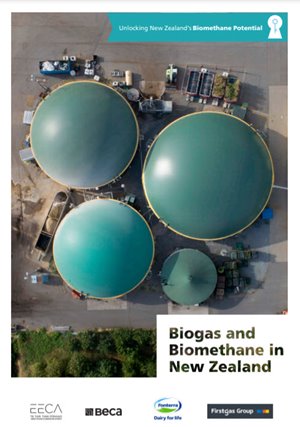A joint study by Beca, Firstgas Group and Fonterra reveals renewable gas is a viable, untapped solution to decarbonising New Zealand’s residential natural gas network right now, with the potential to replace nearly 20% of New Zealand’s total gas usage by 2050.
The report, released on Tuesday 6 July 2021, concluded that 4% of New Zealand’s energy-related emissions could be avoided with biogas upgraded into renewable gas. This could be produced using existing and available organic waste like food waste from your kitchens or farm waste like manure from cow sheds in New Zealand.Eleanor Grant, Beca’s Industrial Sustainability Lead and co-author of the report said their findings prove the viability of renewable gas, which can be used in existing pipeline networks, appliances and equipment, while saving up to 19 times the carbon emissions.
“The recently released Climate Change Report highlighted the opportunity for low emission gases such as biogas and hydrogen in New Zealand to decarbonise industry but indicated a lack of research in the space", Eleanor said. “Our joint study is the evidence needed to prove that renewable gas is a very real solution to decarbonising New Zealand and one that could realistically be having an impact by 2030".
“Our joint study is the evidence needed to prove that renewable gas is a very real solution to decarbonising New Zealand and one that could realistically be having an impact by 2030" - Eleanor Grant, Beca
“Our estimates indicate that implementation of wide-scale anaerobic digestion in New Zealand could produce enough renewable gas to supply all residential users and three quarters of commercial gas users with carbon free fuel, equivalent to taking 415,000 petrol cars off our roads".
“About 10% of this renewable gas can be produced, cleaned and sold economically today using readily available feedstocks, based on current gas sale prices. A further 30-40% would become available in coming decades as natural gas prices increase, driven by Emission Trading Scheme price rises and natural gas scarcity".
“If we forecast to 2050 the economics of this are likely to shift further, which would make things like the hard-to-utilise feedstocks like animal manure and crop residue which don’t currently stack up economically today, become viable", she said.
Small-scale farm and industrial digesters that produce heat and power locally from unrefined biogas can further reduce emissions and create clean energy at scales where biogas cleaning and injection is too difficult. Paul Goodeve, Firstgas Group CE said the study was a major milestone for the gas and agricultural sectors and gas customers who use gas every day.
“Chemically, renewable gas can be a direct substitute for natural gas (meeting the AS/NZS 5442 specifications). Renewable gas can be transported through existing gas pipeline networks without requiring changes to current infrastructure. It also means appliances don’t need to be replaced". “Realising this potential will require cross sector collaboration between industry and local and national Government to develop policy, reforms and remove barriers”, Paul said.
“Chemically, renewable gas can be a direct substitute for natural gas. Renewable gas can be transported through existing gas pipeline networks without requiring changes to current infrastructure. It also means appliances don’t need to be replaced" - Paul Goodeve, Firstgas Group
Fonterra’s Head of Energy and Climate, Linda Mulvihill, said the study provides another potential option to help the Co-operative get to net zero emissions in manufacturing by 2050. “We’re committed to playing our part to help the country transition to a low carbon future. We know the more alternative energy sources we have, the more opportunity we have to utilise the right renewable energy sources in the right place. This study is a good example of how working together – sharing science, expertise and experience – we can find solutions for the good of New Zealand.”
The research found countries that have experienced the fastest and most transformative uptakes in biogas production benefited from support by government via green investment schemes, guaranteed Feed-In Tariffs, as well as cross-industry collaboration.
“Promotion of more circular economies for all kinds of waste in New Zealand would create a more sustainable approach to waste management and allow a more regenerative economy to develop”, said Eleanor. “What we are looking at requires change to how we currently operate. Strategies like this help make alternative biofuels more attractive and more cost-comparative with incumbent fossil fuels in the early stages of investment”, she said.
“Promotion of more circular economies for all kinds of waste in New Zealand would create a more sustainable approach to waste management and allow a more regenerative economy to develop” - Eleanor Grant, Beca
Greg Lowe, CEO of Beca Ltd, said “This study is a great example of what we can accomplish when industry works together to tackle the challenging technical problems we are facing on the path to meeting our nation’s decarbonisation targets". “Collaborative projects like this one, engaging stakeholders and experts across industries and across communities, are key to delivering transformational solutions".
Beca, Firstgas Group and Fonterra collaborated, with funding support from EECA, on the first-of-its-kind study into the potential for RNG to play a key role in the decarbonisation of New Zealand’s energy system. The study team brought together a broad range of knowledge and passion to investigate the potential for alternative fuels, combining Beca’s extensive experience in New Zealand’s Industrial, Water and Energy sectors, with Firstgas’ experience as owner and operator of New Zealand’s largest natural gas network, and Fonterra’s experience as a gas user and New Zealand’s largest existing biogas generator.
 New Zealand
New Zealand
 Australia
Australia
 Singapore
Singapore
